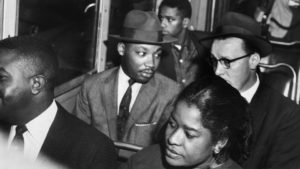Black Lives Matter activists protesting in the name of George Floyd crave something so fundamental that they are willing to cram shoulder to shoulder during COVID19, risking their lives on airless city streets to demand it.
Like physical health, spiritual sustenance is essential to human existence. Like the body, the soul needs to breathe.
In a world seized by pandemic, instinct tells us to hunker down behind our locked doors, to protect ourselves and our families from COVID19. We focus on satisfying our most basic physiological needs: food, air, water, hygiene, sleep.
American psychologist Abraham Maslow famously placed these physiological necessities at the base of a pyramid he called the “hierarchy of needs.” As you climb Maslow’s pyramid, the priorities move from basic physical survival needs to the social needs of love and belonging. The most elusive priority, reserved only for those people with the privilege of reaching the very top of the pyramid, is meaning and self-fulfillment.
As Maslow would have it, human beings put their survival needs ahead of everything else.
Freeing the Spirit from Indignity is Fundamental
Tens of thousands of protestors in cities across the planet reveal a deeper truth: moral conviction also lies at the base of that pyramid.
If self-preservation trumps all, these protests wouldn’t happen. The coronavirus still lurks. The threat is real. And social distancing remains the strongest weapon in the fight against the deadly infection.
What we see instead is throngs of people demanding their dignity, propelled by a spiritual drive for racial justice, racial restoration and racial repair. Protestors risk their lives as a call and a plea for a new and enduring sacred covenant — a collective vow to live in a shared society, fully, equally, and securely.
Black Lives Matter demonstrators marching during the COVID19 crisis remind us that we can lift our heads from our survival needs to fight for what is morally right.
“If I get infected fighting for justice, my soul can sit with that,” Sara Semi told The New York Times at a rally.
The strangled soul is as deadly as any disease.
History has shown us that the fight to free the spirit from indignity and injustice is noble and good and essential.
In the 1960s, Black Americans risked vicious dogs, white-sheeted vigilantes and the very real threat of death to sit at a lunch counter, send their children to school and sit where they chose on a bus.
In an oral history of the civil rights movement, journalist Howell Raines recounts a conversation civil rights leader Martin Luther King, Jr. had with an elderly woman participating in a bus boycott. King thought she needed a break. As Raines recalls it:
“Martin asked this old lady, he said, ‘Now, listen…you have been with us all along, so now you go on and start back to riding the bus, ‘cause you are too old to keep walking.’
She said, ‘Oh, no. I’m gonna walk just as long as everybody else walks. I’m gonna walk til it’s over.’
So he said, ‘But aren’t your feet tired?’
She said, ‘Yes, my feet is tired, but my soul is rested.’
This craving for spiritual freedom dates back thousands of years to the Hebrew Bible. The scriptures use the same word, “neshama,” to mean both soul and breath.
When the soul is deprived of air, when the soul can’t breathe — whether it’s the literal knee of authority on the neck of a restrained African-American man or the suffocating burden of pervasive racism — the soul will wither and die.
That is why people will risk their physical safety to meet spiritual needs deeper than bodily self-preservation. The Black Lives Matter movement in the time of COVID19 shows us that the needs for a life of meaning and self-fulfillment, for a life of freedom, equality and justice, for a life of joy, dignity and human flourishing, aren’t reserved for the extraordinary few at the top of a pyramid.
These are fundamental human needs.
Because like the body, the soul needs to breathe.

